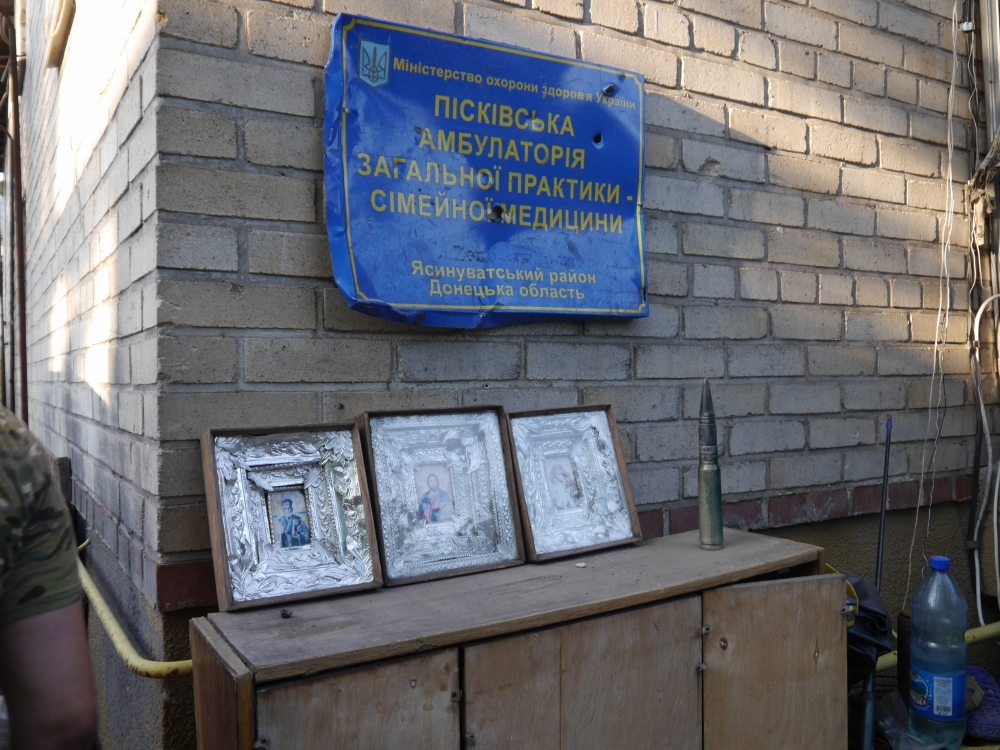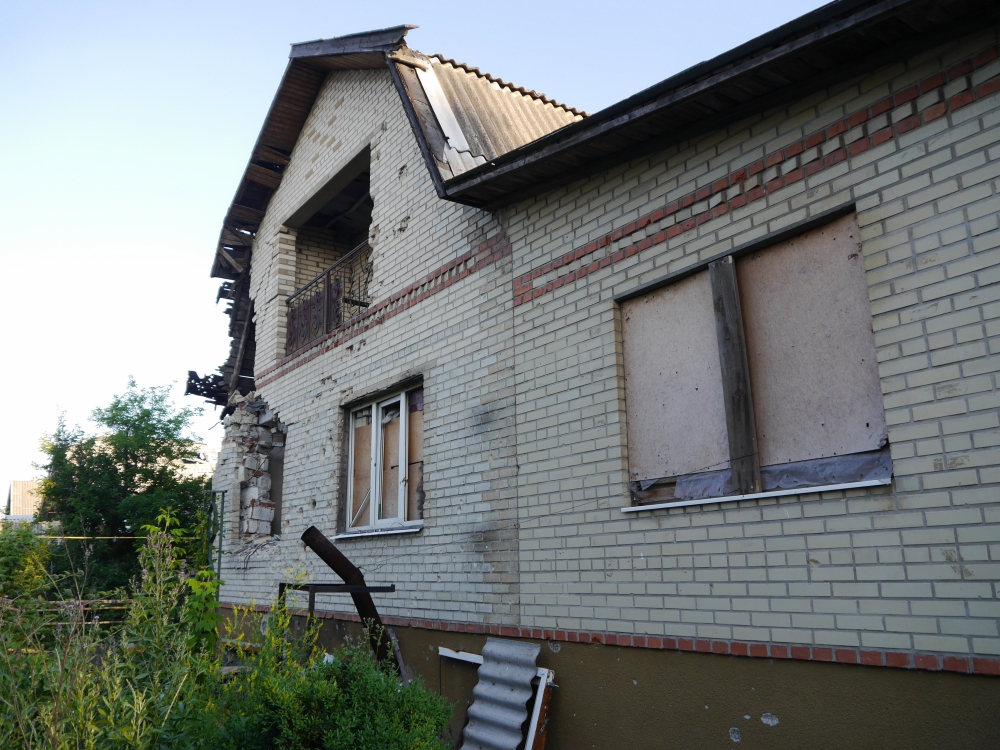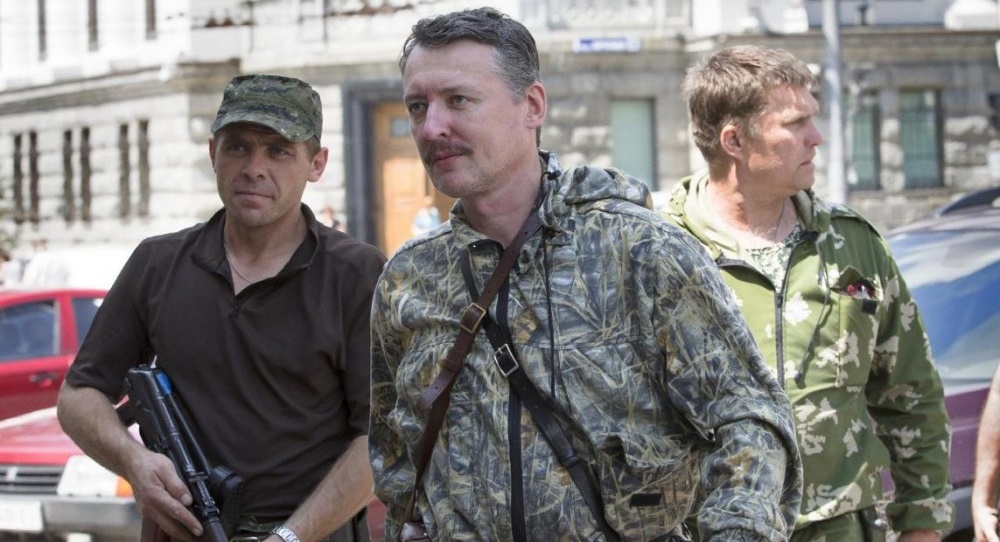-I arrived on December 23, 2014, and I’ve been here since that day. I go home every 2-3 months. My family is very patriotic, so they understand me. They know that if their mother is on the front lines, the enemy will never get through!”
In 2014, Yevdokiya and a doctor friend organized two medical stations on the front. The one that was closer to the front lines was bombed. The second grew and expanded. Then, they moved everything to Pisky. Soldiers call her “Pisky Mom”.

The medical centre is located in one of the village houses. The surgery is in one room. There’s a wheeled stretcher and a medical cabinet. Stepanivna says she’s performed more than one emergency operation here.

-My mother didn’t know I went to Eastern Ukraine. She’s 89. In December 2014, I was supposed to go back home and celebrate Mom’s birthday, but there I was… in Pisky. My mother calls and asks if I’ll come. I tell her I can’t, so she advises me to relax. Next morning she rings again: “Sweetie, tell me where you are. You aren’t in Nadvirna. I’ve just had a strange dream.” My daughter told me that when she visited, mother immediately said: “She went to war, didn’t she?
How and why did you decide to go to war?
-It all began with my elder son-in-law, Roman. He started behaving very strangely. I told my daughter there was something wrong. It turned out he’d enlisted and told us the day before his departure. Then, my other son-in-law in Kyiv was sent to Sloviansk. One day, my daughter called to say she hadn’t heard from him for 3-4 days. The next day, I took some time off work, threw a thermos of coffee into my bag, got into my car, and drove to Kyiv.
-There’s another reason… Our region was flooded in 2008. The hospital in Sievierodonetsk transferred 15,000 UAH to our hospital. We remembered that they’d helped us, and at a meeting in 2014 I told my colleagues that we must help them now. We searched for their contact information, called them and learned that they needed a lot of medicine. So, I started buying drugs and medical supplies and taking them across the country. I remember the first time… I drove into the buffer zone at night, and suddenly I heard shooting everywhere. I asked the driver whether we should continue. He looked at me calmly: “Sure, we’re off! We’ll get through somehow.” And we did.

-The second time was in December 2014. I got a call from our former surgeon who was serving in the Armed Forces: “Listen, I want to go to Pisky. Would you like to come with me?” No problem, I replied. We arrived in the buffer zone and continued to Pisky.
-We came under heavy fire on January 14. They were using SPGs (self-propelled guns) and Grads. A tank gunner covered me because I wasn’t even wearing a bulletproof vest when I jumped out of the car. We sought refuge in a basement. We weren’t allowed to enter Pisky as there was a lot of heavy shelling everywhere. There were explosions and burning building all around us. It was scary.
-Then, the doctor and I took turns driving. It was clear to us that this was not the best solution. Most doctors refuse to travel to such hotspots… But, there were so many wounded. So, I stayed. I lost a lot of weight and slept about three hours a day.
Who finances your clinic?
- Friends and acquaintances help out… all on our own. The Ministry and Army don’t help at all. You know, only about 30 percent of the supplies sent by the Army reach the front, never mind the food! Our soldiers will soon have to buy everything with their own money!

Why aren’t you officially registered yet?
- The registration documents got lost somewhere at the headquarters. When they were finally found, I saw the mess at the Army headquarters and changed my mind. Yes, it’s hard to survive without a salary, but I still have my meager pension. But, it’s better to have a clear conscience because I refuse to obey ridiculous orders. I’m my own boss, and I only depend on the guys. They’re great! They always welcome me with open arms. That’s so nice. They’ve become part of my family, because you go back and forth all the time and you really don’t know what will happen next. The boys ask me whether I ever get angry. Yes, of course I do, but rarely. You shouldn’t keep evil inside because it’s hard to die with this feeling. Here, you have to be honest.
Did you actually want to go?
- I’m a strong woman and I felt I had to go. The 93rd Brigade was deployed to the front for 45 days, but stayed for 10 months. Half of the unit is gone. They’re under fire every day. They’re depressed because they want to return fire but it’s not allowed. We read poetry to the guys, play the guitar, try to entertain them.
-One day, I woke up at 5 in the morning: “I’m gonna get in my car, I won’t tell a soul, and I’m off for ten days!” Next thought: “Silly, aren’t you?” I lay in bed until 7 a.m., then put on my make-up, got into my car, and drove to all the outposts. I felt much better and chased the boys out of the basements. And, ten days before they were re-deployed, the boys seized a couple of NSV machine guns from the “separatists”.
-It was hard at the beginning. Most of the boys weren’t ready for the front. But, we managed and survived. When I told them I was going to Kyiv for a while they came up to me and said: “What’s this? You’re abandoning us?” There was a whole crowd waiting for me in the yard.

How do locals treat you?
- They stop me on the road, ask me about medical treatments and look for advice. There’s this woman in Vodyane (town in Donetsk Oblast-Ed.)
. She was very pro-Russian. Recently, she stopped me and told me she had low blood pressure… takes medicine every day, but it doesn’t help. I told her to take a drug containing some caffeine so as to raise the blood pressure. Now, she’s not a “separatist” anymore. She saw that our guys didn’t vandalize or destroy her apartment. The “banderites” didn’t steal anything from her.
-Another time, a man in Selidove said: “What are you, a banderivka, doing here?” Now, he’s a good friend. He works as a security guard at Rinat Akhmetov’s supermarket. He apologized, and now when I enter the store, he says: “Hey there, Stepanivna, where have you been?”
-Here, in Pisky, we found a human skull near Sasha the dentist’s house (Oleksandr, Viktor Yanukovych’s son, a dentist by profession - Ed.). The boys drained the neighbouring ponds and found some broken bones, skulls with broken jaws, bodies weighed down with weights - traces of torture. There were a lot of bodies. Such were the methods used by Yanukovych.
What’s the hardest thing in war?
- Death. You make friends and share things together. All the soldiers have become close friends. They’re my children.
-It was especially hard when a good friend, a soldier called “SMS” was killed. In May he was to turn 25, and in the summer he was going to marry. He was killed instantly by an AGS (grenade launcher). So many fragments pierced his body… I cried and screamed. That’s the first time the boys heard me swearing. Then, I got into the car and took the first wounded guy to the clinic. The doctor told me that “SMS” was the 200th victim. I called up the boys and told them to fire at the enemy in honour of “SMS”. All the boys came to my place afterwards… they cried. Let me tell you something about “SMS”. He was called up for active duty. He had two brothers, who are also fighting. He had bad teeth, and I forced him to take care of them. “You have to look good when you get married.” He agreed, but two days later he was killed.
-Yura from Dnipro-1 Regiment died quietly. He was wounded by a sniper. He was a good man, a policeman by profession. It was the first time I’d met a decent cop... He fell asleep on the ninth day after and didn’t wake up. 19-year-old “Telefonchyk” was also supposed to live…

Do you see anything positive in war?
- Our guys are good fighters. They change when they encounter danger and death. They all have different personalities, and yet they start worrying and caring for others. Here, the others become dearer to you than anything else. They’re different when they leave here. But, it’s so difficult for them in civil society. Many of them suffer from PTSD. Our people aren’t very interested in the war. It affects only families who have someone on the front lines. Most people are indifferent. Many volunteers suffer from the same syndrome because once they’ve been here, they can’t get used to normal life again.
-The boys get together a lot. It’s interesting to observe them because they’re all very different. But, if they find friends here, it’ll be for life. Let me tell you about two friends from the 93rd
Brigade – “Slonik” (Little Elephant) and “Tioma”. I’ve known them for ten months, but only by their call signs. When Slonik was wounded during combat, we pulled him out unconscious; he had no pulse. Tioma jumped in to help and broke his nose. Blood started spurting from his nose, but he didn’t care. He was worried about his friend. We treated Slonik and he started breathing. I gave Tioma a tissue to stop the bleeding. “No, no, Stepanivna, take care of Slonik!” Only when Slonik was breathing again could I start treating Tioma. I told him he had to get some X-rays done. “Stepanivna, everything will be all right!” he says.
-When the 93rd was ready to leave, I made a lot of borshch. We sat around and talked… They’ve all become very good friends…
The soldiers call you “Mom”. Do you try to educate them?
- They really see me as their mother, and not a potential wife. You have to be strict with them so they understand who you are. But, I sometimes say: “Son, come here, my little boy.” I sometimes scold them, but I don’t like doing this.
-They often ask me to bring them some equipment. The men from the 128th once gave me a list of what they needed. I brought them what I had. They’d arrived in Pisky half-naked and barefoot. The volunteers and I helped out.
-Once we had a drug addict, a soldier that came here for drugs and nothing else. He had severe seizures and body spasms. We struggled with him for two weeks and he finally got better. His mother called and thanked us. She said that we’d done more than all the hospitals. His nervous system stabilized and he returned to normal life.
-Another boy was a vegetarian. I told him I’d cook his food separately. He was surprised. I make some soup, give him his bowl, and throw in some meat for the rest of the boys. He lived with me later. When they were re-deployed, he looked at me sadly: “Mom, they’re taking us away.” We’re still in touch.
What’s your greatest disappointment after two years of war?
- The inertia and passivity of our government. I thought they’d declare war; our guys could advance and liberate some of the occupied territories. Who will answer for all the deaths and mutilated bodies and souls? We all know how our government works. No one benefits from this. Poroshenko let Yanukovych escape… but today, the people will not let those in power escape. One day, I was driving along the Dnipro waterfront in Kyiv and I saw all these luxurious yachts. At least three grenades are needed here as a warning, I said to myself.
Interview with Yevdokiya Popovych (4:17 min in Ukrainian) (video: Eldar Sarakhman for Gazeta.ua)
[embedyt] http://www.youtube.com/watch?v=RTCantt4eBk[/embedyt]




